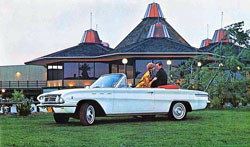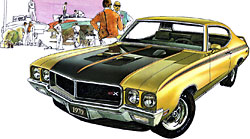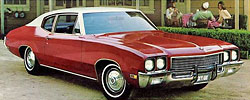1961-1972 Skylark, GS, GSX
Buick re-launched the Special nameplate, which had a legacy dating back to 1936, on GM’s new, unitized Y-body platform in 1961. It was shared with the Pontiac Tempest and Oldsmobile F-85 – compact cars developed to compete with the wave of European small cars that were turning heads and ringing up sales. And just like its corporate cousins, the base-model spawned an up-level trim package: Skylark (LeMans for Pontiac and Cutlass for Oldsmobile).
 A compact, all-aluminum 215-cubic-inch V-8 was one of the ’61 Special/Skylark’s unique features and in 1962, the engine spawned an iron-block V-6 version that helped the car win over Motor Trend for its coveted Car of the Year award, but by the end of 1963 the Buick/Olds/Pontiac trio exited the fledgling compact segment when it didn’t prove as large as anticipated.
A compact, all-aluminum 215-cubic-inch V-8 was one of the ’61 Special/Skylark’s unique features and in 1962, the engine spawned an iron-block V-6 version that helped the car win over Motor Trend for its coveted Car of the Year award, but by the end of 1963 the Buick/Olds/Pontiac trio exited the fledgling compact segment when it didn’t prove as large as anticipated.
Buick moved the Special and Skylark names to the company’s version of GM’s new full-frame “intermediate”-sized platform, known as the A-body, in 1964. They grew about 3 inches in wheelbase, more than a foot in length and put on about 300 pounds. Part of the weight increase came from a new 300-inch iron-block V-8 that replaced the aluminum engine – although it was based on its design. On the larger platform, sales for the cars picked up considerably.
Buick Shows its Muscle
 Despite engineering some undeniably powerful cars, Buick never chased the high-performance market until 1965 and the introduction of the Gran Sport. It was a response to the wild success of the Pontiac GTO and the other GM brands – except Cadillac – scrambled to create their own muscle cars. In keeping with Buick’s luxury leanings, however, the Gran Sport was a well-equipped performer, not a stripped-down hot rod.
Despite engineering some undeniably powerful cars, Buick never chased the high-performance market until 1965 and the introduction of the Gran Sport. It was a response to the wild success of the Pontiac GTO and the other GM brands – except Cadillac – scrambled to create their own muscle cars. In keeping with Buick’s luxury leanings, however, the Gran Sport was a well-equipped performer, not a stripped-down hot rod.
The first Gran Sports were based on the Skylark and powered by a 401-cubic-inch V-8 from Buick’s full-size lineup, which was dubbed Wildcat 445 – not for its horsepower, but its torque. The horsepower rating was 325. Performance was good, but not the stuff of Beach Boys songs. Nonetheless Buick sold more than 16,000 Gran Sports in 1965, becoming an official combatant in the muscle car wars.
 Gran Sport became GS in 1967 and Buick’s characteristically reserved aesthetic was temporarily discarded 1970, with the introduction of the GSX – a boldly styled GS powered by the 455 V-8 that produced a mountain-moving 510 lb-ft of torque. A Stage 1 version matched the torque with 360 horsepower, which was enough to send the car down the drag strip in about 13.8 seconds. Only 678 were built that first year, although less-powerful editions were offered in 1971 and ’72.
Gran Sport became GS in 1967 and Buick’s characteristically reserved aesthetic was temporarily discarded 1970, with the introduction of the GSX – a boldly styled GS powered by the 455 V-8 that produced a mountain-moving 510 lb-ft of torque. A Stage 1 version matched the torque with 360 horsepower, which was enough to send the car down the drag strip in about 13.8 seconds. Only 678 were built that first year, although less-powerful editions were offered in 1971 and ’72.
All About the Torque
As the auto industry down-shifted from the high-compression highs of the muscle car years, Buick’s impact lingered in its 350 and 455 V-8 engines. Despite lower compression ratios and emissions equipment galore, the engines had very good cylinder heads that enabled them to make the most of the restricted air they processed. The company that was just about last to the muscle car market turned out to be nearly the last to leave, as customers continued to flock to the big-torque Buicks.
 GM revamped the A-body platform for 1973, adding length and consequently weight to cars that were losing horsepower, but again, the torque of the Buick engines gave the brand an edge. Unfortunately, the Special, Skylark and GSX were no longer part of the lineup. They were replaced by the Century and the Gran Sport remained as an option – offering a 455 Stage 1 to keep Buick’s big-torque flame alive.
GM revamped the A-body platform for 1973, adding length and consequently weight to cars that were losing horsepower, but again, the torque of the Buick engines gave the brand an edge. Unfortunately, the Special, Skylark and GSX were no longer part of the lineup. They were replaced by the Century and the Gran Sport remained as an option – offering a 455 Stage 1 to keep Buick’s big-torque flame alive.
As one of the industry’s largest restoration suppliers, Original Parts Group offers thousands of 1961-72 Buick Skylark parts and accessories including Buick Special parts and Buick GS/GSX parts, with new parts added daily. Our extensive catalog offers nearly everything from sheet metal, chrome and upholstery to engine parts and the hard-to-find details to finish a restoration with show-winning attention to detail. Shop online or order your OPGI Skylark/Special/GS parts catalog today.